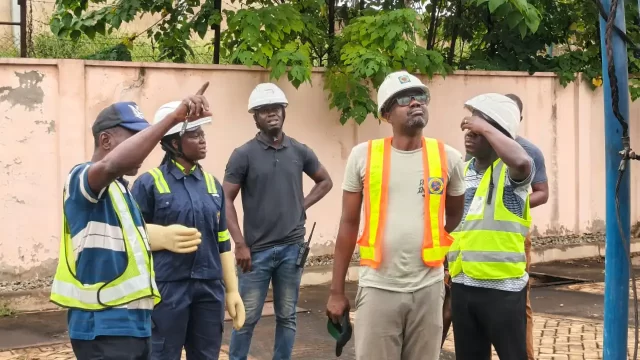A man suspected of stealing cables was electrocuted near the Adoato Substation in Ghana’s Ashanti Region, prompting urgent safety warnings from the Electricity Company of Ghana (ECG).
The incident spurred a visit by Ing. Peter Fletcher, General Manager of ECG’s Ashanti Sub-Transmission Division, who inspected the site and addressed growing concerns over public interference with electrical infrastructure.
Fletcher, speaking to journalists during the assessment, emphasized the lethal risks of tampering with power installations. “Electricity is indispensable but deadly when mishandled,” he stated. “This tragic loss of life underscores the need for communities to prioritize safety and report suspicious activities near substations immediately.” His remarks followed the discovery of the deceased individual, who allegedly attempted to steal cables from the facility a recurring issue complicating ECG’s efforts to ensure reliable power distribution.
The company has intensified collaborations with local leaders and law enforcement to curb vandalism and illegal connections, which jeopardize both public safety and grid stability. Fletcher reiterated that damaging ECG infrastructure not only risks lives but also disrupts electricity access for thousands, exacerbating economic and social challenges in affected areas.
Ghana has faced persistent struggles with cable theft, driven by black-market demand for copper and aluminum. Such incidents frequently lead to prolonged outages, repair costs exceeding $1 million annually, and heightened risks for ECG technicians tasked with restoring services. The Adoato case has reignited calls for stricter enforcement of laws criminalizing infrastructure interference, with penalties including fines and imprisonment.
While ECG ramps up public education campaigns on electrical safety, analysts note broader systemic hurdles. Urbanization and unemployment in regions like Ashanti have fueled illegal activities, creating a cycle of risk and resource depletion. Community leaders argue that addressing root causes such as youth job creation is critical to reducing vandalism.
The fatality coincides with national efforts to modernize Ghana’s power grid, a project integral to sustaining economic growth. Experts warn that persistent infrastructure sabotage could delay these upgrades, leaving the country vulnerable to energy shortfalls. As ECG balances enforcement with community engagement, the Adoato incident serves as a stark reminder of the human cost of infrastructure theft and the collective responsibility to prevent it.
Send your news stories to newsghana101@gmail.com
Follow News Ghana on Google News


















